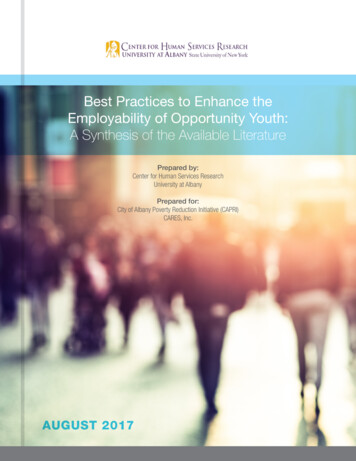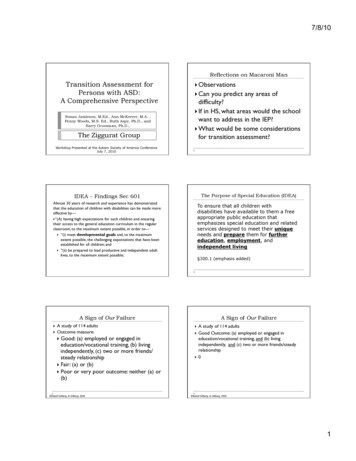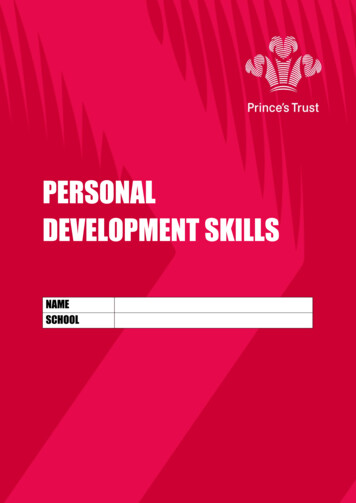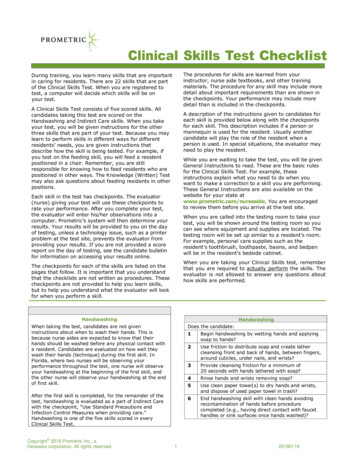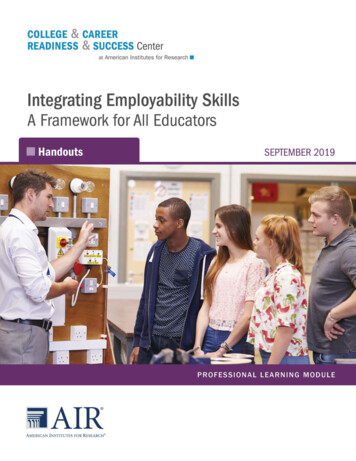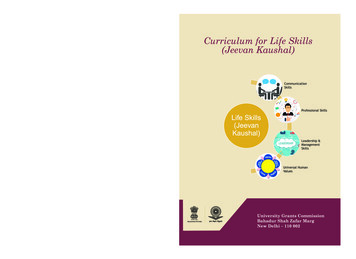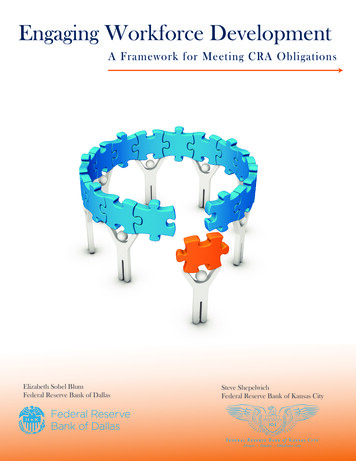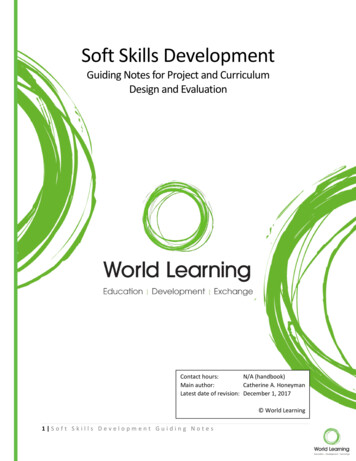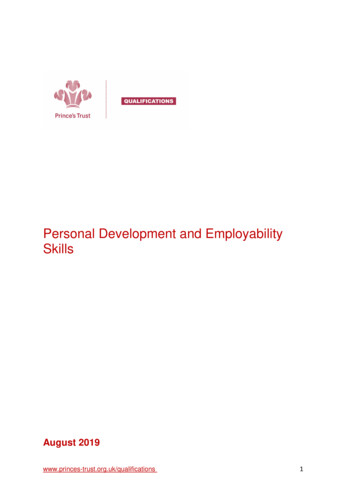
Transcription
Personal Development and EmployabilitySkillsAugust 2019www.princes-trust.org.uk/qualifications1
Purpose of this documentThe Qualification Specification is designed to give centres information so that theycan offer the Personal Development and Employability Skills qualifications to theirlearners. It contains the information to ensure learners complete the correct numberof units and in the correct combination to meet the qualification structures and therules of combination required.This document must be read in conjunction with the following documents to ensurecentres and learners have all the information about how to achieve thesequalifications.Qualification Support Pack 00 – Centre HandbookThis handbook explains the administration processes that support qualificationdelivery, for example how to become an Approved Centre, what accessarrangements Prince’s Trust Qualifications (PTQ) has for learners with specialrequirements, what level of service you can expect from ourselves and what systemsand sanctions PTQ uses should malpractice or maladministration be suspected.This handbook also outlines the roles and responsibilities expected of an Assessorand Internal Quality Assurer within a centre, and provides competency profiles foreach role.Qualification Support Pack 01 – Building a PortfolioThis handbook is a good practice guide to building a portfolio and is intended tosupport centres when designing assessment activities and supporting portfolioevidence formats. It gives examples of common issues and practical steps toovercome them.The examples used are not all specific to the Personal Development andEmployability Skills qualification but the principles explained still apply.Qualification Support Pack 02 – Internal Quality AssuranceThis handbook describes the different internal quality assurance activities that maybe undertaken within centres and gives good practice examples which centres canuse to support their own practice.Qualification Support Pack 03 – Making Claims and ResultsThis handbook explains the administration processes when making a claim for unitsor qualifications, issuing of certificates, the resubmission process as well as theAppeals Procedure. PTQ’s assessment strategy can also be found in this handbookas well as information outlining the retention of evidence requirements.All these handbooks can be found on our Qualifications webpage (www.princestrust.org.uk/qualifications) by clicking on the country where the qualification will bedelivered and then following the link to ‘Guidance for Centres’ or by following thehyperlink above.www.princes-trust.org.uk/qualifications2
ContentsPurpose of this document . 2Regulatory requirements . 4Qualification Aim . 5Qualification Summaries – Entry 3 . 6Qualification Summaries - Level 1 . 7Qualification Summaries - Level 2 . 8Qualification Structures . 9Award Qualification Structure . 9Certificate Qualification Structure . 9Diploma Qualification Structure . 9Units . 10Rules of Combination . 11Barred Combinations . 11Progression . 11Language. 11Access Arrangements. 11Grading . 12Evidence . 12Recording Achievement . 13Making claims . 13Staff requirements . 14Support for centres . 14Appendix list . 15Appendix 1 . 16Appendix 2 . 46Appendix 3 . 47Appendix 4 . 49www.princes-trust.org.uk/qualifications3
In 40 years The Prince's Trust has worked with over 825,000 young people givingpractical and financial support to develop key work skills helping them move intoemployment, education and training.The Prince's Trust is recognised by the qualification regulators in England, Wales,Northern Ireland and Scotland to develop, offer and award qualifications.Prince's Trust Qualifications seek to:Ensure young people have every opportunity to gain formal recognition of theirskills and achievements Develop qualifications that offer flexibility, choice and pathways to progression Provide excellent support and service to our partners to ensure they are bestplaced to support young people Recognising that many young people lack formal qualifications we actively promote ourqualifications to those who need them most; young people who have struggled at schoolor are long term unemployed, those who have poor mental health, are addicted to drugsor alcohol, have been in care, are homeless or have been in trouble with the law, singleparents, asylum seekers and refugees.Quality of Service:Prince’s Trust Qualifications believes that all young people should have the chance tosucceed. We want you to have a positive experience when you work with us, so we arecommitted to ensuring that: You will be treated equally and with respect Your information will only be used in a way we’ve agreed with you, unless you tellus something that places you or others at risk of harm You can expect to be treated by staff in a professional manner You can also expect our staff to be approachable, inspiring, empowering,passionate and non-judgementalRegulatory requirementsPrince’s Trust Qualifications is regulated by all UK qualification regulators and as suchour regulatory responsibilities are: Maintaining the integrity of nationally recognised qualifications Issuing formal qualification and unit certificates Ensuring qualifications are accessible to all and free from barriers anddiscrimination Continuous self-assessment to ensure units and qualifications are robust and fitfor purpose Meeting regulatory criteria and principlesContact details:Prince’s Trust Qualifications9 Eldon Street, London EC2M 7LS020 7543 -trust.org.uk/qualifications4
Qualification AimThe Prince’s Trust qualifications in Personal Development and Employability Skillsrecognise a breadth of personal skills, qualities and attitudes required by employersacross a range of sectors. They have been developed with the aim of progressinglearners into further education and/or employment and are available for use with preand post 16 learners:They give learners the opportunity to: Develop their own personal growth and engagement in, and through, learning Engage in learning that is relevant to them and support their development of personalskills and attributes that are essential for working life and employment Prepare themselves for progression into further educationprogrammes, apprenticeships or other work based learning Develop their English and mathematics skillswww.princes-trust.org.uk/qualifications5
Qualification Summaries – Entry 3Prince’s Trust Entry 3 Award in Personal Development and Employability SkillsQualification frameworkQualification number (QN)QW Approval/Designation No.Date for registrationsAge rangeCredit value rangeMinimum % of credits required at Entry 3Assessment of qualificationGuided learning hours (GLH)Total Qualification Time (TQT)Grading informationEntry requirementsRQF600/6952/1C00/0511/1November 2012Pre 16, 16-18, 19 6 - 1851%Portfolio of evidence, centre assessment5460Pass gradeLearners do not need any otherqualifications as pre-requisites to entryPrince’s Trust Entry 3 Certificate in Personal Development and Employability SkillsQualification frameworkRQFQualification number (QN)600/8034/6QW Approval/Designation No.C00/0525/5Date for registrationsFebruary 2013Age rangePre 16, 16-18, 19 Credit value range21- 36Minimum % of credits required at Entry 351%Assessment of qualificationPortfolio of evidence, centre assessmentGuided learning hours (GLH)201Total Qualification Time (TQT)210Grading informationPass gradeLearners do not need any otherEntry requirementsqualifications as pre-requisites to entrywww.princes-trust.org.uk/qualifications6
Qualification Summaries - Level 1Prince’s Trust Level 1 Award in Personal Development and Employability SkillsQualification frameworkQualification number (QN)QW Approval/Designation No.Date for registrationsAge rangeCredit value rangeMinimum % of credits required at Level 1Assessment of qualificationGuided learning hours (GLH)Total Qualification Time (TQT)Grading informationEntry requirementsRQF600/8032/2C00/0525/3February 2013Pre 16, 16-18, 19 6 - 1851%Portfolio of evidence, centre assessment5460Pass gradeLearners do not need any otherqualifications as pre-requisites to entryPrince’s Trust Level 1 Certificate in Personal Development and Employability SkillsQualification frameworkRQFQualification number (QN)600/7958/7QW Approval/Designation No.C00/0525/6Date for registrationsFebruary 2013Age rangePre 16, 16-18, 19 Credit value21- 36Minimum % of credits required at Level 151%Assessment of qualificationPortfolio of evidence, centre assessmentGuided learning hours (GLH)201Total Qualification Time (TQT)210Grading informationPass gradeLearners do not need any otherEntry requirementsqualifications as pre-requisites to entryPrince’s Trust Level 1 Diploma in Personal Development and Employability SkillsQualification frameworkRQFQualification number (QN)601/4129/3QW Approval/Designation No.C00/3773/9Date for registrationsSeptember 2014Age rangePre 16, 16-18, 19 Credit value range39 - 57Minimum % of credits required at Level 151%Assessment of qualificationPortfolio of evidence, centre assessmentGuided learning hours (GLH)369Total Qualification Time (TQT)390Grading informationPass gradeLearners do not need any otherEntry requirementsqualifications as pre-requisites to entrywww.princes-trust.org.uk/qualifications7
Qualification Summaries - Level 2Prince’s Trust Level 2 Award in Personal Development and Employability SkillsQualification frameworkQualification number (QN)QW Approval/Designation No.Date for registrationsAge rangeCredit value rangeMinimum % of credits required at Level 2Assessment of qualificationGuided learning hours (GLH)Total Qualification Time (TQT)Grading informationEntry requirementsRQF600/8033/4C00/0525/4February 2013Pre 16, 16-18, 19 6 - 1851%Portfolio of evidence, centre assessment5460Pass gradeLearners do not need any otherqualifications as pre-requisites to entryPrince’s Trust Level 2 Certificate in Personal Development and Employability SkillsQualification frameworkQualification number (QN)QW Approval/Designation No.Date for registrationsAge rangeCredit value rangeMinimum % of credits required at Level 2Assessment of qualificationGuided learning hours (GLH)Total Qualification Time (TQT)Grading informationEntry requirementsRQF600/8035/8C00/0525/7February 2013Pre 16, 16-18, 19 21 - 3651%Portfolio of evidence, centre assessment201210Pass gradeLearners do not need any otherqualifications as pre-requisites to entryPrince’s Trust Level 2 Diploma in Personal Development and Employability SkillsQualification frameworkRQFQualification number (QN)603/1408/4QW Approval/Designation No.C00/3774/0Date for registrationsJune 2017Age rangePre 16, 16-18, 19 Credit value range39 - 57Minimum % of credits required at Level 251%Assessment of qualificationPortfolio of evidence, centre assessmentGuided learning hours (GLH)369Total Qualification Time (TQT)390Grading informationPass gradeLearners do not need any otherEntry requirementsqualifications as pre-requisites to entrywww.princes-trust.org.uk/qualifications8
Qualification StructuresAward Qualification StructureThe rules of combination detailed below need to be met before Prince’s TrustQualifications can award any of the Award sized qualifications.Minimum number of units to be achievedMinimum number of credits to be achievedMaximum number of credits to be achieved2618The qualification will be awarded at the level at which the majority of credits have beenachieved.Barred combination – ‘Participating in Exercise’ and ‘Preparing for a Healthy Lifestyle’units cannot be claimed as the only two units for an Award. If these two units are beingclaimed a third unit must be claimed as well in order to meet the overall requirementsof the qualification.If Awards are being claimed with the minimum number of credits, all six credits mustbe at the same level for the qualification to be awarded.Certificate Qualification StructureThe rules of combination detailed below need to be met before Prince’s TrustQualifications can award any of the Certificate sized qualifications.Minimum number of credits to be achievedMaximum number of credits to be achieved2136The qualification will be awarded at the level at which the majority of credits have beenachieved.Diploma Qualification StructureThe rules of combination detailed below need to be met before Prince’s TrustQualifications can award any of the Diploma sized qualifications.Minimum number of credits to be achievedMaximum number of credits to be achieved3957The qualification will be awarded at the level at which the majority of credits have beenachieved.In recognition of the fact that some learners can achieve different levels for differentunits, PTQ operate on the basis that learners can achieve units within the samequalification at one level above or one level below the level of the overall qualificationclaimed. For further guidance please see Appendix 4.www.princes-trust.org.uk/qualifications9
UnitsThe Personal Development and Employability Skills qualifications cover a range ofskills. An overview of the units available and the corresponding levels and credits isgiven below.Unit titleCareer PlanningCommunity ProjectCustomer ServiceDigital SkillsInterpersonal and Self-ManagementSkillsManaging MoneyParticipating in ExercisePersonal ProjectPlanning for Personal DevelopmentPractising Leadership SkillsPreparing for a Healthy LifestylePresentation SkillsTeamwork SkillsUndertaking an Enterprise ProjectWork ExperienceAvailable atCreditEntry 3Level 1 Level 2 value 3 6 3 3 3 3333333366For more detail of the individual units and the assessment criteria please seeAppendix 1.Appendix 2 provides the level descriptors for the three levels covered by the unitsand ions10
Rules of CombinationWhen meeting rules of combination, learners do not have to achieve units in anyparticular order and Assessors should tailor learning programmes to meet individuallearner needs. It is recommended that, wherever possible, centres adopt a holisticapproach to the delivery of these qualifications and identify opportunities to link theunits and levels.Learners not able to complete a full qualification can have their achievementsrecognised through unit only certification.Barred CombinationsLearners undertaking the same units at different levels will have the higher level unitawarded for a qualification. Units with the same or similar titles cannot both becounted towards the same qualification.‘Participating in Exercise’ and ‘Preparing for a Healthy Lifestyle’ units cannot beclaimed as the only two units for an Award. If these two units are being claimed a thirdunit must be claimed as well to meet the overall requirements for the qualification.If you are unsure about the rules of combination for a qualification please contactPrince’s Trust Qualifications to discuss.ProgressionThese qualifications provide a platform for learners to progress onto further educationopportunities and/or employment, as they develop personal development andemployability skills.LanguageIf you wish to offer these qualifications in Welsh please contact The Prince’s TrustQualifications.Access ArrangementsMore detailed information about the Special Consideration and ReasonableAdjustments policies for these qualifications is provided in the Centre Handbook(QSP 00)www.princes-trust.org.uk/qualifications11
Assessment of QualificationsGradingThe Personal Development and Employability Skills qualifications are 100% centreassessed using portfolios of evidence and are graded as pass or fail. The portfoliosare internally assessed and externally moderated.The assessment process is as follows: Activities are internally set by the centre to meet the requirements detailed in theunit assessment criteria The learners are assessed internally at the centre by an Assessor whilst theyengage in activities The learner’s evidence is collated into a portfolio, which is referenced using a unitTracking Sheet The centre undertakes internal quality assurance activities which includessampling portfolios assessed by each Assessor. A further sample of portfolios is then externally moderated by Prince’s TrustQualificationsWith these qualifications the best practice approach is to assess by ‘continuousassessment’. This means that the learner is assessed throughout their programmeof study, allowing for alternative activities to be set and further evidence producedwhile there are still opportunities during the programme. Continuous assessmentkeeps learners motivated and engaged as it provides the learner with opportunitiesto discuss progress, check they are working at the correct level for their ability andproducing sufficient evidence. This open dialogue with the learner should berecorded on their portfolio, directly on their work and on the Tracking Sheet in theform of assessor feedback. The writing of comments on learners’ work, and TrackingSheets, provides a means of communication between staff during the internal qualityassurance and with the External Moderator if the work forms part of the moderationsample.More detailed information about the assessment strategies for these qualifications isprovided in the Centre Handbook (QSP 00) and Making Claims and ResultsHandbook (QSP 03), both are available on our website Guidance for centresEvidenceTo achieve the units and qualifications learners need to gather evidence from activitieswhich demonstrate they have met each of the assessment criteria. Some evidence ofa learner’s performance will also be derived from observation records and testimoniesfrom witnesses, who observe the learner carrying out activities. Evidence can be in avariety of forms and can be varied according to learners’ interests and needs.Through completion of activities on the learning programme, the learners shouldgenerate evidence to demonstrate they have completed all of the assessment criteriasufficiently.More detailed information is provided in the Building a Portfolio handbook (QSP 01)which is available on our website Guidance for centreswww.princes-trust.org.uk/qualifications12
Recording AchievementWhen learners have gathered their evidence, Tracking Sheets are used to recordwhich piece(s) of evidence meets each assessment criteria. Learners are likely tocollect far more evidence than they need and it is therefore important that the TrackingSheets are only used to record the specific evidence needed to meet the criteria andnot every piece of work produced.The Tracking Sheets must be signed and dated by the learner and the Assessor. Bysigning the Tracking Sheets the learner and Assessor are declaring that the portfoliosubmitted is the learner’s own work. The qualification will not be awarded without asigned declaration.The Trust does not require every piece of evidence to be signed and dated.Tracking Sheets for this qualification can be downloaded from our website.Making claimsCentres should only claim units and qualifications for learners when they are satisfiedthat their portfolio meets all the assessment criteria and the work has under goneinternal quality assurance. Making claims is the official stage of notifying Prince’sTrust Qualifications that the learners are being submitted for external moderation.There will be regular opportunities to submit learners’ portfolios throughout the year.Please check the qualification web page for the latest dates: Prince's ications13
Staff requirementsTo adhere to The Prince’s Trust quality assurance arrangements for thesequalifications, the centre must ensure that the following roles and responsibilities havebeen undertaken: Assessors Internal Quality Assurer (IQA)The same person must never complete the internal quality assurance processes onportfolios they have assessed. More detailed information for the Assessor and InternalQuality Assurers roles, with competency profiles, is provided in the Centre Handbook(QSP 00) available on our website Guidance for centresSupport for centresTrainingPrince’s Trust Qualifications offers training to support centres deliver and administerthese qualifications.WebsiteOur website is regularly updated to ensure the latest information about the qualificationis available to centre staff, as too are best practice guidance notes and policies. Thewebsite can be accessed via the following link: Prince's Trust ons14
Appendix listAppendix 1 - Unit overview tableAppendix 2 - Level descriptorsAppendix 3 - Rules of Combination illustrative examplesAppendix 4 - Qualification price listwww.princes-trust.org.uk/qualifications15
Appendix 1The units listed below are available for use from 1st January 2017.Unit titleCareer PlanningCommunity ProjectCustomer ServiceDigital SkillsInterpersonal and SelfManagement SkillsManaging MoneyParticipating in ExercisePersonal ProjectPlanning for PersonalDevelopmentPractising Leadership SkillsPreparing for a HealthyLifestylePresentation SkillsLevelEntry 3Level 1Level 2Entry 3Level 1Level 2Entry 3Level 1Level 2Entry 3Level 1Level 2Entry 3Level 1Level 2Entry 3Level 1Level 2Entry 3Level 1Level 2Entry 3Level 1Level 2Entry 3Level 1Level 2Entry 3Level 1Level 2Entry 3Level 1Level 2Entry 3Level 1Level 2727272727303030PTQ 62D/615/4163H/615/416416
Teamwork SkillsUndertaking an EnterpriseProjectWork ExperienceEntry 3Level 1Level 2Entry 3Level 1Level 2Entry 3Level 1Level J/615/4190Y/615/4193H/615/4195T/615/4198The assessment criteria for the units at each level can be found on thefollowing pages.www.princes-trust.org.uk/qualifications17
Career PlanningThe aim of this unit is to give the learner an understanding of the job search,application and interview process in order to equip them with the skills necessary toprogress onto a sustainable job/training opportunity that is suited to their interests. Itis an opportunity for learners to think about careers they may wish to pursue, andreflect upon the training, education and experience required in that profession.With the high demand for jobs, learners need to be aware of where to search forsuitable jobs and how to best present themselves both, using their CVs or applications,and in person when they get to the interview.Be able torecognise suitablejobs or trainingopportunitiesUnderstand how toapply for jobs ortrainingopportunitiesEntry 31.1 Identify sourcesof careersadvice andguidance1.2 Give anexample of acareer optionrelevant to owninterests1.3 Outline likelytasks that youwouldundertake inthis careeroption2.1 Complete anapplication formLevel 11.1 Identify sourcesof careers adviceand guidanceLevel 21.1 Identify sourcesof careers adviceand guidance1.2 Give examples ofcareer optionsrelevant to owninterests1.2 Give example ofcareer optionsrelevant to owninterests1.3 Describeadvantages anddisadvantages ofthe identifiedcareer options1.3 Compareadvantages anddisadvantages ofthe identifiedcareer options1.4 Identify jobvacancies ortrainingopportunitiesrelevant to theidentified careeroptions1.4 Outline trainingand educationalneeds for apreferred option2.1 Produce apersonal CV in aformatappropriate forseekingemployment2.2 Complete anapplication formto an appropriatestandard forsubmission1.5 Describe yoursuitability for thepreferred option2.1 Produce apersonal CV in aformat appropriatefor seekingemployment2.2 Produce acovering letter tosupport your CVfor a specific job2.3 Complete anapplication form toan appropriatestandard ns18
Be able to take partin an interviewKnow how toprepare for aninterview (E3)3.1 Identifyappropriatebehaviour andclothing for aninterview3.2 Identifyquestions thatyou may beasked in aninterview3.3 Prepareresponses topotentialinterviewquestions3.1 List what toconsider whenpreparing for aninterview3.2 Prepareresponses topotentialinterviewquestions3.3 Take part in areal or simulatedinterview3.4 Identify personalstrengths andareas forimprovementfollowing aninterview3.1 Explain whatneeds to beconsidered whenpreparing for aninterview3.2 Prepareresponses topotential interviewquestions3.3 Give examples ofquestions youwould ask at aninterview3.4 Take part in areal or simulatedinterview3.5 Review personalstrengths andareas forimprovementfollowing 19
Community ProjectThe aim of this unit is for the learner to plan, complete and review a project in the widercommunity. As part of the planning the learners should have some involvement inselecting the project undertaken. The community project can be completed by anindividual but is more likely to be undertaken by a group of learners and as such theywill look at how the skills within the group can be used to complete the project bydividing up the different roles and responsibilities.The length and scope of the project will depend on the time and resources availablehowever, it should reflect the 60 TQT assigned to the unit. The tutor/supervisor willneed to ensure all aspects of the project are safe and legal.Entry 3Understand the1.1 Give examplesneeds of their widerof potentialcommunity and howprojects thatthey can be metcould help thewider community1.2 Select acommunityproject toundertake1.3 Identify a benefitof the project tothe widercommunityBe able to plan asuitable communityprojectLevel 11.1 Give examplesof potentialprojects thatcould help thewider community1.2 Identifyadvantages anddisadvantages oftwo potentialcommunityprojects1.3 Describe thebenefits of thechosen projectto the widercommunity2.1 Identify how youwill contribute tothe communityproject2.1 Identify thetasks needed forthe communityproject2.2 Identify theequipment andmaterialsrequired for thecommunityproject2.3 Identify anycosts or Gift inKind savingsassociated withthe project2.2 List theequipment andmaterialsrequired for thecommunityproject2.3 Calculate costsor Gift in Kindsavingsassociated withthe tionsLevel 21.1 Describe theneeds of the widercommunity1.2 Assess theadvantages anddisadvantages oftwo potentialcommunityprojects1.3 Explain why thecommunity projectwas chosen1.4 Explain how theproject is going tomeet the needs ofthe widercommunity2.1 Produce adetailed plan forthe activitiesstating who willcomplete eachtask and when2.2 List the resourcesneeded for thecommunity project2.3 Calculate costs orGift in Kindsavingsassociated withthe communityproject20
Be able to carry outa communityproject2.4 Give a deadlinefor thecommunityproject to becompleted3.1 Identify thepossible hazardsfor own tasksundertaken2.4 Produce atimeline for thecommunityproject2.4 Explain withreasons anyexternal helprequired3.1 Give examplesof possiblehazards with theproject andactions taken toreduce them3.2 Identify anysupport requiredto complet
The Prince’s Trust qualifications in Personal Development and Employability Skills recognise a breadth of personal skills, qualities and attitudes required by employers across a range of sectors. They have been developed with the aim of progressing learners into further educa
